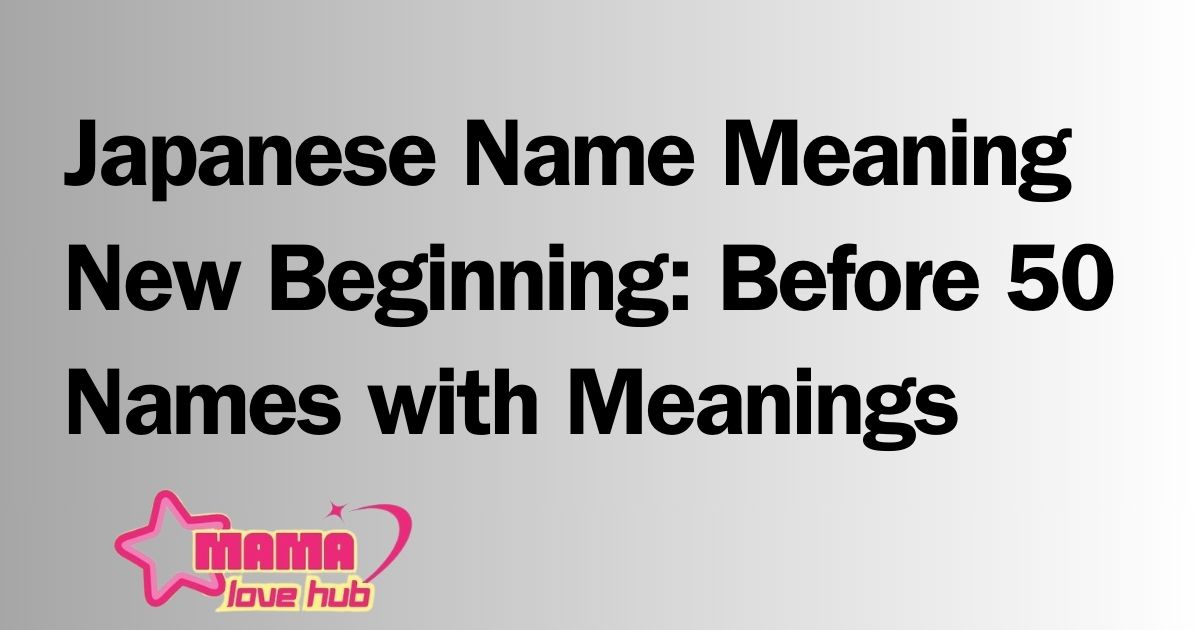Japanese Name Meaning New Beginning: Before 50 Names with Meanings
In Japanese culture, names hold deep significance, often reflecting values, aspirations, and hopes for the future. The idea of new beginnings is particularly cherished, symbolizing fresh starts and opportunities for growth. In this article, we delve into the world of Japanese names with meanings related to new beginnings, providing a diverse selection of names along with their significance.
Understanding Japanese Naming Culture
Japanese naming conventions have evolved over centuries, influenced by historical, cultural, and religious factors. Names are carefully chosen to reflect familial lineage, personal attributes, and auspicious meanings. The importance of names is evident in various aspects of Japanese life, from formal ceremonies to everyday interactions.
Concept of New Beginnings in Japanese Culture
New beginnings hold profound significance in Japanese society, embodying themes of renewal, regeneration, and optimism. From the changing seasons to life milestones such as births and weddings, the concept of starting anew is deeply ingrained in Japanese culture. Traditional ceremonies and rituals often emphasize the symbolic power of new beginnings, celebrating transitions with reverence and joy.

Popular Japanese Names with New Beginnings Meanings
Haruto (春人): Meaning “spring person,” Haruto signifies the arrival of a new season and the promise of growth.
Akari (明里): Combining “light” and “village,” Akari represents the illumination of new paths and opportunities.
Natsuki (夏樹): Translating to “summer tree,” Natsuki evokes images of vitality and flourishing during the warm months.

Names for Boys
Ren (蓮): Symbolizing the lotus flower, Ren represents purity and enlightenment, marking the beginning of a spiritual journey.
Kaito (海斗): Meaning “ocean constellation,” Kaito embodies the vastness of possibilities and the adventure of exploration.
Haruto (春人): Meaning “spring person,” symbolizing the start of a new season and the promise of growth.
Ren (蓮): Signifying the lotus flower, representing purity, enlightenment, and the beginning of a spiritual journey.
Kaito (海斗): Translating to “ocean constellation,” embodying the vastness of possibilities and the adventure of exploration.
Yuma (悠真): Combining “distant” and “truth,” suggesting the pursuit of truth and wisdom in new beginnings.
Sora (空): Signifying “sky,” evoking feelings of freedom, expansiveness, and the limitless potential of new beginnings.
Riku (陸): Translating to “land,” symbolizing stability, grounding, and the foundation for embarking on new endeavors.
Akira (明): Meaning “bright” or “clear,” suggesting clarity of purpose and vision in embracing new beginnings.
Taiga (大河): Combining “big” and “river,” representing the vastness and depth of possibilities in new beginnings.
Takumi (匠): Signifying “artisan” or “craftsman,” reflecting the beginning of a journey towards mastery and creativity.
Akihiro (明宏): Translating to “great brightness,” symbolizing the dawn of new opportunities and achievements.
Daiki (大輝): Meaning “big radiance,” suggesting the shining brilliance and potential inherent in new beginnings.
Haruki (春樹): Signifying “spring tree,” evoking images of vitality, growth, and the renewal of life in new beginnings.
Yuki (幸): Signifying “happiness” or “luck,” embodying the joy and blessings that accompany new beginnings.
Satoshi (聡): Translating to “wise” or “intelligent,” symbolizing the discernment and clarity of thought needed in new beginnings.
Tatsuya (達也): Signifying “achieve” and “also,” suggesting the attainment of goals and aspirations in new beginnings.
Ryo (涼): Translating to “cool” or “refreshing,” evoking feelings of tranquility, calmness, and renewal in new beginnings.
Daisuke (大輔): Meaning “big help,” suggesting the supportive presence and encouragement offered in new beginnings.
Takashi (隆): Meaning “prosperous” or “noble,” representing the abundance and dignity of new beginnings.
Yusuke (祐介): Signifying “blessing assistance,” embodying the supportive presence and guidance offered in new beginnings.
Nao (直): Translating to “straight” or “honest,” symbolizing integrity, authenticity, and clarity of purpose in new beginnings.
Satoru (悟): Meaning “enlightenment” or “understanding,” representing the deep insight and wisdom gained in new beginnings.
Kazuma (一真): Signifying “one truth,” embodying the clarity, purity, and singularity of purpose in new beginnings.
Shogo (翔吾): Combining “soar” and “I,” suggesting the individual’s ability to rise above challenges and embrace new beginnings.
Riku (陸): Meaning “land” or “shore,” representing the solid foundation and stability of new beginnings.
Soma (蒼真): Combining “blue” and “truth,” suggesting the depth and clarity of insight found in new beginnings.
Kota (康太): Translating to “healthy big,” symbolizing the robustness and vitality of new beginnings.
Shinji (信二): Meaning “faithful second,” representing the steadfastness and reliability of new beginnings.
Yuma (裕磨): Combining “abundant” and “polish,” suggesting the refinement and growth experienced in new beginnings.
Koki (光希): Translating to “light hope,” symbolizing the optimism and brightness of new beginnings.
Ren (蓮): Signifying the lotus flower, symbolizing purity, enlightenment, and the beginning of a spiritual journey.

Names for Girls
Hinata (陽向): Derived from “sun” and “towards,” Hinata conveys the warmth of new beginnings and the direction towards a brighter future.
Yui (結衣): Signifying “binding cloth,” Yui represents the weaving together of relationships and the start of meaningful connections.
Hinata (陽向): Derived from “sun” and “towards,” symbolizing the warmth and direction of new beginnings.
Akari (明里): Combining “light” and “village,” representing the illumination and clarity of new paths.
Yui (結衣): Signifying “binding cloth,” embodying the unity and interconnectedness of new beginnings.
Sakura (桜): Meaning “cherry blossom,” symbolizing the beauty, transience, and renewal of new beginnings.
Aoi (葵): Translating to “hollyhock,” representing resilience, strength, and the ability to overcome challenges in new beginnings.
Hana (花): Signifying “flower,” evoking images of growth, beauty, and the blossoming of new beginnings.
Sora (空): Meaning “sky,” representing the vastness, freedom, and boundless potential of new beginnings.
Koharu (小春): Translating to “small spring,” symbolizing the freshness, vitality, and promise of new beginnings.
Rina (莉菜): Meaning “white jasmine,” representing purity, innocence, and the simplicity of new beginnings.
Nao (菜緒): Signifying “vegetables” and “thread,” representing the nourishment and connection of new beginnings.
Mana (愛菜): Meaning “love” and “vegetables,” embodying the nurturing and growth found in new beginnings.
Mio (美緒): Combining “beautiful” and “thread,” symbolizing the interconnectedness and continuity of new beginnings.
Yume (夢): Translating to “dream,” representing the aspirations, possibilities, and imagination of new beginnings.
Risa (理沙): Signifying “reason” and “sand,” suggesting the stability and foundation of new beginnings.
Nana (菜々): Combining “vegetables” and “vegetables,” symbolizing the abundance and nourishment of new beginnings.
Kaede (楓): Translating to “maple,” representing the changing seasons and renewal of new beginnings.
Kana (香奈): Signifying “fragrance” and “apple tree,” embodying the freshness and vitality of new beginnings.
Yui (結衣): Meaning “binding cloth,” symbolizing the unity, connection, and continuity of new beginnings.
Hinako (陽子): Combining “sun” and “child,” representing the warmth and innocence of new beginnings.
Miho (美穂): Translating to “beautiful” and “grain,” symbolizing the abundance and fertility of new beginnings.
Ayaka (彩花): Signifying “color” and “flower,” embodying the vibrancy and beauty of new beginnings.
Saki (咲): Meaning “bloom,” representing the blossoming and flourishing of new beginnings.
Yuri (百合): Signifying “lily,” representing purity, innocence, and the beauty of new beginnings.
Choosing the Right Name
When selecting a Japanese name with a new beginning meaning, it’s essential to consider factors such as personal significance, cultural resonance, and phonetic harmony. Parents and individuals are encouraged to explore the rich tapestry of Japanese names, finding one that resonates deeply with their aspirations and values.
Cultural Significance
Japanese names not only reflect individual identities but also carry broader cultural significance. They serve as a bridge between past traditions and future aspirations, embodying the collective spirit of Japanese society. The profound meanings behind names enrich personal narratives and contribute to the cultural tapestry of Japan.
Modern Trends in Japanese Naming
In contemporary Japan, naming trends continue to evolve, reflecting shifts in societal values and global influences. While traditional names remain popular, modern parents also seek names that resonate with global audiences and embody cosmopolitan ideals. This fusion of tradition and innovation highlights the dynamic nature of Japanese naming practices.
Celebrity Examples
Notable figures such as Haruki Murakami and Yoko Ono exemplify the enduring appeal of Japanese names with new beginning meanings. Their achievements and contributions serve as inspirations for individuals bearing similar names, reinforcing the symbolic power of names in shaping destinies.
Naming Ceremonies
Traditional naming ceremonies, known as “name-kai,” are integral to Japanese culture, marking the formal introduction of newborns to family and community. These ceremonies often involve rituals such as the writing of names in calligraphy and the offering of prayers for the child’s future. Such rituals emphasize the sacredness of names and the importance of community support.
Impact of Japanese Names Globally
With the increasing globalization of culture, Japanese names have gained recognition and appreciation worldwide. From popular anime characters to renowned cultural icons, Japanese names with new beginning meanings resonate with diverse audiences, transcending linguistic and cultural barriers. Their universal appeal reflects the enduring allure of Japanese culture on the global stage.
Future Trends
Looking ahead, the future of Japanese naming practices is likely to be influenced by ongoing societal changes and cultural exchanges. As Japan embraces innovation and diversity, names with new beginning meanings will continue to evolve, reflecting the aspirations and values of contemporary society. Amidst these changes, the timeless symbolism of new beginnings will remain a cherished hallmark of Japanese identity.
Conclusion
In conclusion, Japanese names with meanings related to new beginnings encapsulate the essence of fresh starts, optimism, and the enduring spirit of growth. From traditional names rooted in centuries-old customs to modern appellations inspired by global trends, Japanese naming culture reflects a vibrant tapestry of meanings and aspirations.
As individuals embark on life’s journey, the significance of their names becomes a guiding beacon, reminding them of their heritage, values, and the promise of new beginnings. Whether celebrating the birth of a child, embarking on a new career path, or embracing personal growth, Japanese names serve as constant reminders of the transformative power of change.
In a world marked by rapid transitions and uncertainty, the symbolism of new beginnings embodied in Japanese names resonates deeply with people from all walks of life. They offer a sense of hope, resilience, and renewal, inspiring individuals to embrace the possibilities that each day brings.
As we navigate the complexities of modern existence, let us draw inspiration from the rich tapestry of Japanese naming culture. May we cherish the significance of our names, honoring the legacies they carry and the futures they promise. For in the journey of life, every new beginning is an opportunity to write our own story, guided by the wisdom and symbolism encapsulated in our names.
Questions and Answers:
Q: How do Japanese naming conventions differ from those in Western cultures?
A: Japanese names often prioritize meanings and symbolism, reflecting familial lineage and aspirations, whereas Western names may focus more on personal preferences or familial traditions.
Q: What role do naming ceremonies play in Japanese society?
A: Naming ceremonies, known as “name-kai,” are significant cultural events where newborns are formally introduced to family and community, often involving rituals to bless the child’s future.
Q: Are there any modern trends influencing Japanese naming practices?
A: Yes, globalization and cultural exchanges have led to the adoption of names inspired by global trends and popular culture, alongside traditional Japanese names.
Q: How do Japanese names with new beginning meanings impact individuals’ lives?
A: These names serve as constant reminders of hope, resilience, and the potential for personal growth, influencing individuals’ perceptions of themselves and their aspirations.
Q: What are some famous examples of Japanese names with new beginning meanings in popular culture?
A: Characters from popular anime and manga often bear names with symbolic meanings related to new beginnings, such as Naruto (鳴門), meaning “maelstrom,” symbolizing the character’s journey of self-discovery and growth.

